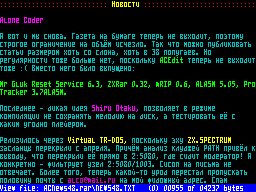|
15 декабря 2015 |
|

ZX Spectrum in GDR (DDR) by utz Although being far ahead of the West in the early days of the computer age, by the 1980s the situation in the GDR looked as grim as just about anywhere in the Eastern block. Official GDR-produced computers were mostly unavailable to the public, western computers had to be either illegally imported or (after 1985) bought for "hard" currency and at horrendous prices at the "Intershop", and although there were many hobbyist computer designs published in various magazines and books from 1984 onwards, few of them were actually built due to the unavailability of the necessary components. Nevertheless, there were several Spectrum clones made, though none of them was produced in any significant quantities. The first GDR clone, called GDC1 (Grafik-Display-Computer 1), was developed at the TH Ilmenau (Technical University Ilmenau) in 1985. Like all GDR ZX clones, it uses the home-made U880 CPU in place of a Z80. It's compatibility is rather limited: The CPU pauses during screen redraw, IO is controlled via a PIO rather than IO ports, and of course no ULA (replaced by 2 domestically made PIOs (U855) and a CTC (U857)). Also, the ROM consist of just a ЧKB EPROM bootloader, which loads the actual OS from tape. The machine had 64K RAM in the standard configuration and could be extended to 256K. There were several versions of this machine, all with a similar configuration. It is not known how many boards were produced, and only very few survive today. The nickname "FDJ-Computer" suggests that it was endorsed by the FDJ (Free German Youth, the state-run youth organization) in some places. http://www.robotron-net.de/eigenbau.html#GDC Next, we had Spectral, also known as EPRO2. It was developed by IFAM (Engineer Office for Applied Microelectronics) Erfurt in 1987, build by VEB Mikroelektronik "Karl Marx", and sold by VEB Robotron-Vertrieb Erfurt from December 1988 on. Latter company still exists today under the name "Hubner-Elektronik", as well as the IFAM, which still holds the rights to the design. The machine had 48K of RAM (extendable to 128K) and supposedly had a very high level of compatibility with the original Spectrum, unlike most other GDR clones. As a bonus, it sported a joystick port. http://www.sax.de/~zander/zx/spectral.html http://www.robotron-net.de/eigenbau.html#Spectral A project was done to rebuild the Spectral some years ago: http://www.sax.de/~zander/zx/spec_nb.html Also in 1987/88, the HCX was developed by the Technical University and the Schwermaschinenbau-Kombinat "Ernst Thalmann" in Magdeburg (SKET, Heavy Machinery Combinate). It had only limited compatibility (ULA simulated by U885 and U887 standard ICs, modified ROM), but sported two joystick ports. The HCX was supposed to be mass-produced, but never made it into serial production. 30 boards were produced by VEB GALVANO in Wernigerode in 1989, and assembled into full machines by a local computer hobbyist club in Magdeburg. No working machines are known to have survived. http://www.sax.de/~zander/zx/hcx.html http://www.robotron-net.de/eigenbau.html#HCX Near the very end of the GDR, the AdW - ZKI (Academy of Science of the GDR, Central Institute for Cybernetics and Information Processing) in Berlin, released the KuBбЧ, which was sold in kit form by the ZWG (Center for Scientific Machine Construction) in Liebenwalde. Like the GDC, it contained only a 1K or 2K bootloader EPROM to load the OS from tape, but otherwise it is said to have been very compatible with the original Spectrum. Also, there were designs for extending the ROM to 16K and thus integrating the ROM into the machine. It had a built-in floppy disk controller (U8272, a clone of NEC pd765/Intel 8272), and thus could run CP/M. Also, it could be connected to a Robotron K7222 system monitor as well as the usual RF. Only 4 machines are known to have survived to the present day. http://www.sax.de/~zander/zx/kubбЧ.html Another ZX clone was developed at the Halbleiterwerk-Frankfurt/Oder (Semiconductor Plant Frankfurt/Oder). Little is known about this machine, but two surviving boards have been restored to working order. http://www.sax.de/~zander/zx/hfo.html Some even more obscure hobbyist clones exist. The only one that is at least documented to some extent is the "ZX-Jena" (http://www.sax.de/~zander/zx/zxj.html). Another self-made design was the BCS 03 (http://www.robotron-net.de/eigenbau.html#BCS). Only a few photos still exist of the latter, though rumour has it that the design was published in a magazine somewhere. Further info: http://www.robotrontechnik.de/html/computer/bausaetze.htm * * * > Wow! I haven't heard about these clones before! Interesting > thing is loading "ROM" data from tape, I knew this in > ATM Turbo only, as an option > (it was mentioned in documentation, I don't know actual > computers made this way). Seems it was rather common in GDR, other (non-Spectrum compatibles) did this as well. Probably for reasons of the usual economic mismanagement, they had enough RAM but a shortage of larger ROM chips. Or perhaps a lack of suitable EPROM burners. But I can only speculate about this. utz
Other articles:
|
|
|
|
|
|
|
|
|
|
|
|
Similar articles:
В этот день... 14 February